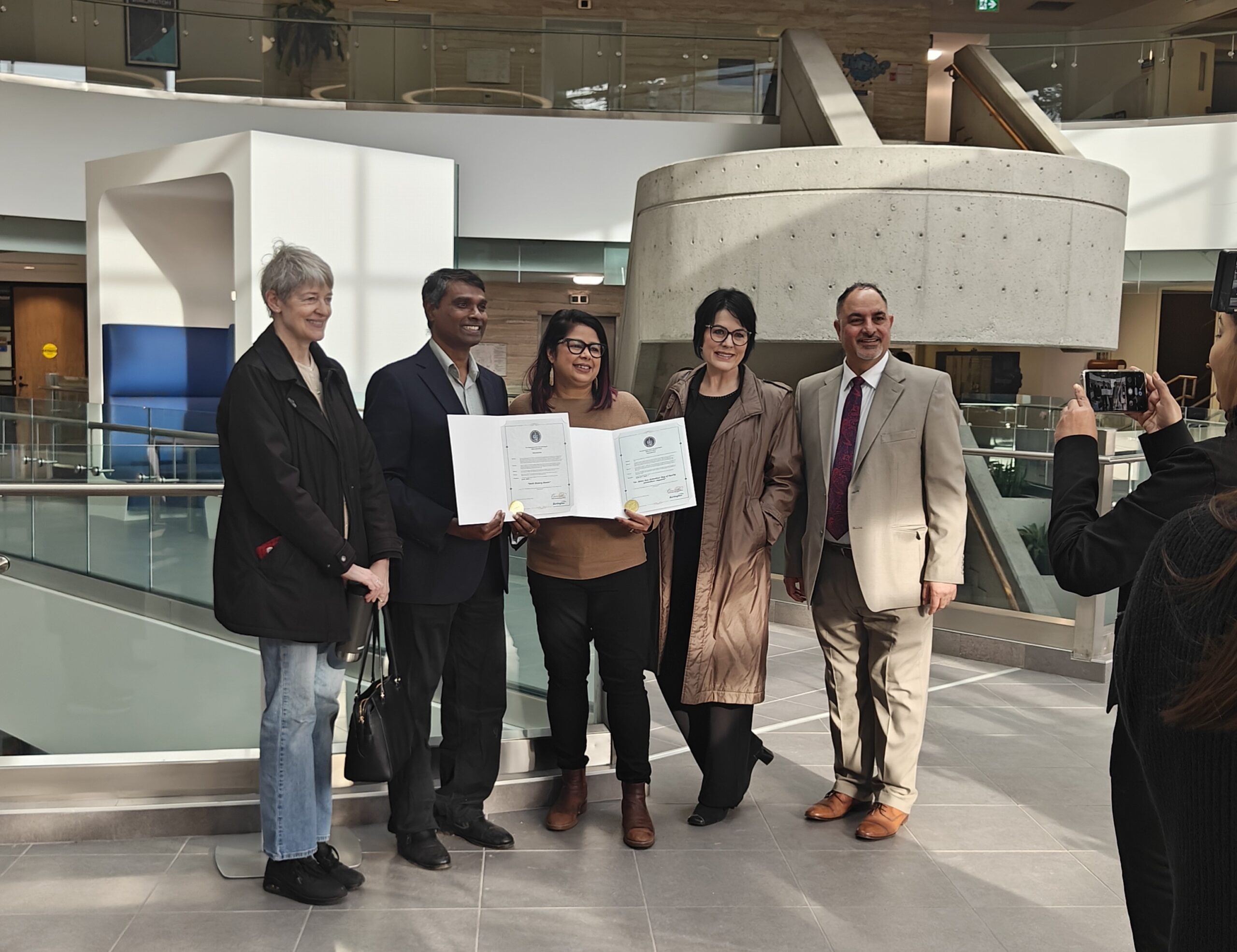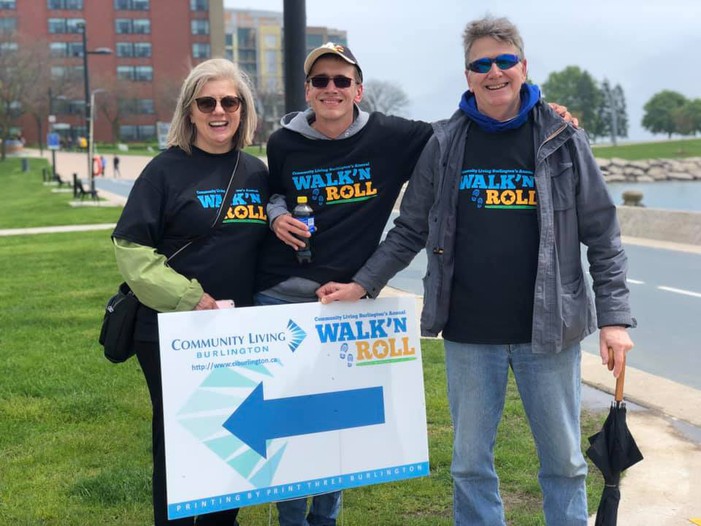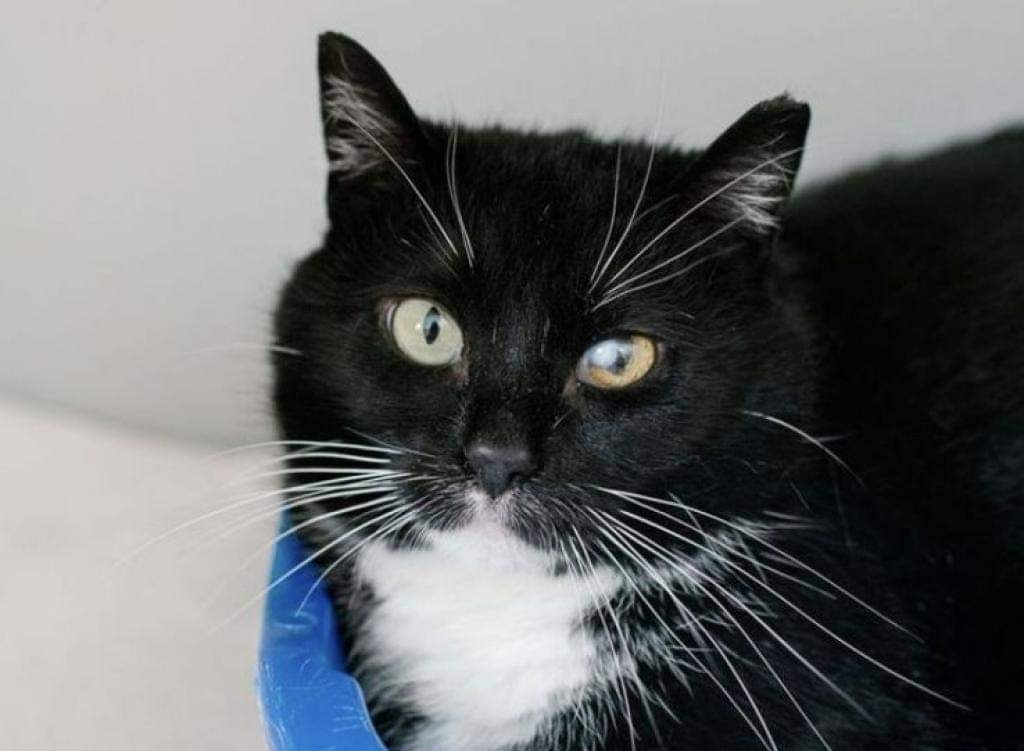On March 19, the City of Burlington recognized April 2024 as Dalit History Month and April 14 as Dr. Bhim Rao Ambedkar Day of Equity, the first municipality in Ontario to do so.
I had the privilege of submitting these motions, inspired by the work of the City of Burnaby and the Province of British Columbia, who have previously recognized these dates and am proud to know that our municipal leadership, through these proclamations, is giving voice and platform to what is often the invisible and silent suffering of many of our community members.
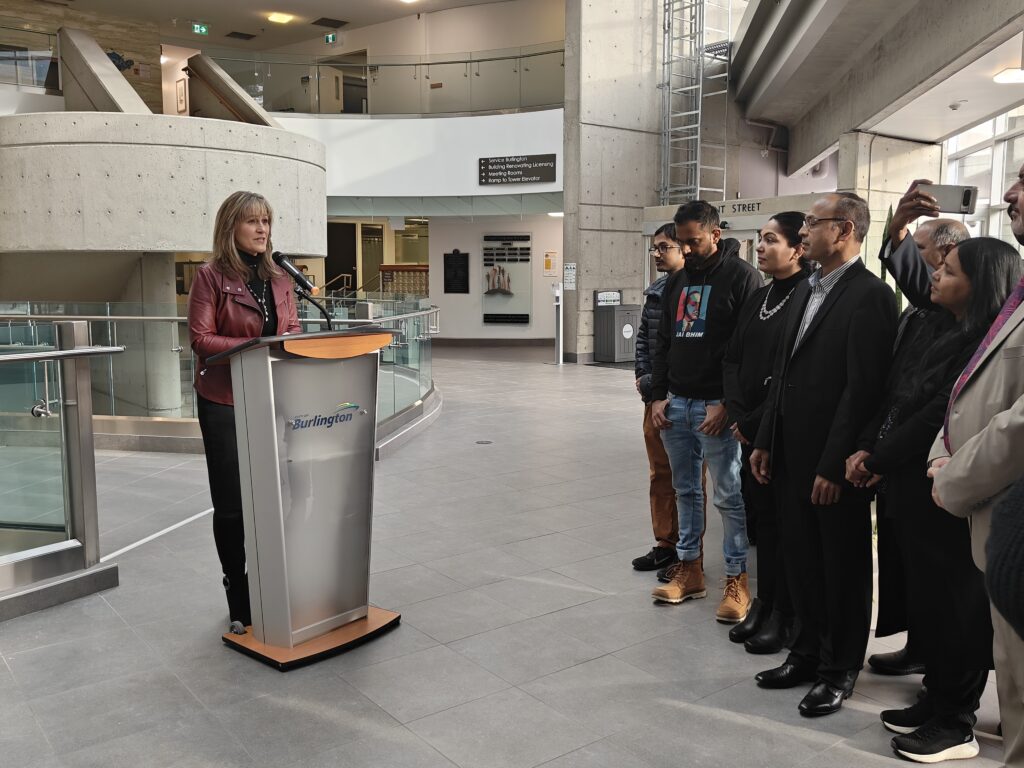
I am a privileged body in the harmful system of caste supremacy, a brahmin (which is recognizable by many from the South Asian community by my last name at birth, Sharma). It is thus my work and responsibility, and the work of all of those bodies who are privileged in this system, to recognize the harm and dehumanization that makes this privilege possible, and to raise awareness, challenge, and disrupt caste discrimination wherever and whenever it happens.
The caste system, a social hierarchy that has endured for over 3,000 years in India, is inherited through family lines, which is why under the caste system, I am considered a brahmin: because my parents and their parents before them were also brahmins. Caste categorization determines not only one’s profession but also aspects of their social life, such as “appropriate” marriage partners. Although initially associated with Hinduism, nearly all Indians today, irrespective of their religious beliefs, identify with a caste.
The Rig Veda, a sacred Hindu text dating back some 3500 years, contains the first known references to a social hierarchy. It contains a hymn that describes four categories (varnas) of Hindu society as originating from the Purusha (the “supreme being”). The four groups are the brahmins (priest class); the kshatriyas (warriors); the vaishyas (business class); and the shudras (labourers); these groups are said to have emerged from the being’s head, arms, thighs, and feet, respectively. However, the hymn does not elaborate on these categories or explicitly outline any hierarchy amongst them.
Although initially people were classified into varnas by assessing personal qualities and talents, the varnas eventually evolved into birthrights. The caste system was born. However, there was another group of people, who were considered outside of the caste system — the “untouchables,” or Dalit.
Regardless of location and language, and despite some regional differences in the ranking of the other castes, or “jatis,” Dalits are invariably considered the lowest-ranked group. This placement brought with it assigned and often dangerous and dehumanizing jobs like manual scavenging, which is the hand-cleaning of human waste from septic tanks and sewers. Though manual scavenging was prohibited by law in 2013, people can still be found doing this job in many parts of India.
Here in Canada, the experiences of discrimination of those who identify as caste-oppressed are heartbreaking and speak to the deep inequities that continue to persist in diasporan communities.
Meera Solanki Estrada, founder of Fusia Media and someone I consider a Dalit activist and leader in my local community, has shared her experiences of the harm from caste supremacy. In a video on YouTube, she tells a story of a conversation with an old friend of hers, who used a surrogate in India to have her baby. Both Estrada and her friend are Indian-Canadian. Estrada had read about caste-oppressed surrogates being paid less than higher-caste women in India; her friend confirmed that, and then said, “I wouldn’t use a lower-caste surrogate. I wouldn’t want my kid to be stupid.”
Estrada is from one of the oppressed castes. She had not shared this with her friend of over 20 years out of shame and fear. Estrada described hearing that comment as feeling “like a punch in the gut.”
The experience of revealing caste or having one’s caste exposed without consent has been likened to the experience of those who identify with the 2SLGBTQIA+ community in terms of “coming out.” The vulnerability that members of the Dalit community feel drives the need to hide or mask their identity to avoid harm, and also highlights the very real risks Dalit community members face in choosing to “come out” or reveal their identities.
John Spencer David, a queer and Dalit activist based in Toronto, spoke about the intersectional experience of casteism and racism in queer spaces, places where he had hoped to find solidarity, in a 2023 article in the Toronto Star. He described other queer people talking about caste markers, such as eating beef (the privileged castes are historically vegetarian), and using the word “pariah,” which is a casteist slur; the word literally means “one who is of a lower caste.” As David notes, “What did we do to be lower? We just live.”
More people like Estrada and David are openly identifying as Dalit, sharing their stories to bring awareness to caste discrimination, with the ultimate goal of eliminating it. Dalit History Month is a more formal version of this sharing, established to educate and build awareness of the history, contributions, and struggles of Dalits. It is typically observed in April, coinciding with the birth anniversary of Dr. B.R. Ambedkar, a prominent Dalit leader and the architect of the Constitution of India.
During Dalit History Month, various events, discussions, and educational initiatives are organized to raise awareness about Dalit history and promote social justice and equality for Dalit communities. The month serves as a platform to celebrate Dalit resilience, culture, and achievements, while also shedding light on the ongoing challenges and discrimination faced by Dalits in society.
The South Asian Dalit Adivasi Network (SADAN) Canada has organized a series of events, including an educational event featuring speakers and cultural performances, titled the Caste Equity and Social Justice Movements in North America, which is happening on Saturday, April 13, 2024, in Mississauga.
Nearer the end of the month, I have the privilege of participating in “From Silence to Solidarity: Combating Caste and Gender Violence in the Workplace,” on Wednesday, April 24 from 10 a.m. to 11:30 a.m., an event hosted by the Society of Gender Professionals. Alongside Christina Dhanuja, a member of the Dalit History Month Collective, which is responsible for establishing Dalit History Month, we’ll delve into the complexities of caste, how caste discrimination and violence are perpetuated, and its intersectionality with other systems of marginalization. Drawing parallels to white supremacy, Christina and I will discuss caste from the perspective of the Indian communities that exist outside of India, emphasizing the importance of understanding how identities as both oppressor (as people born into caste-privileged bodies) and oppressed (as racialized women in Canada) intersect, and how we can use this awareness to challenge and disrupt these entrenched systems of oppression in the workplace. To register for this event, click here.
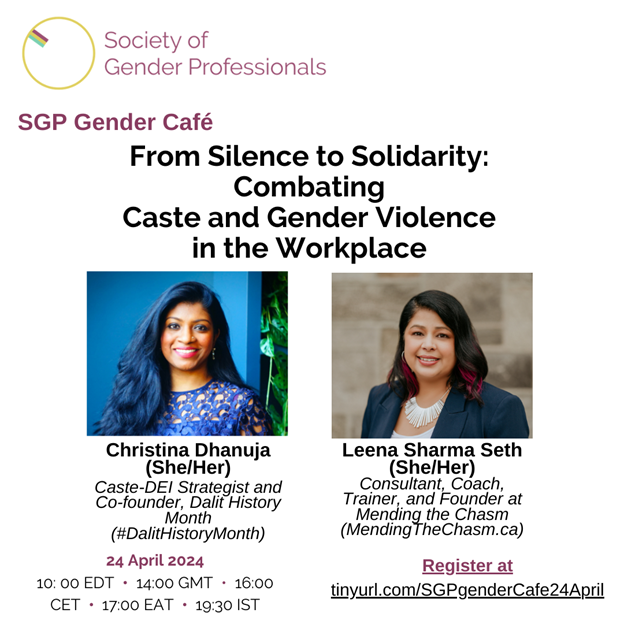
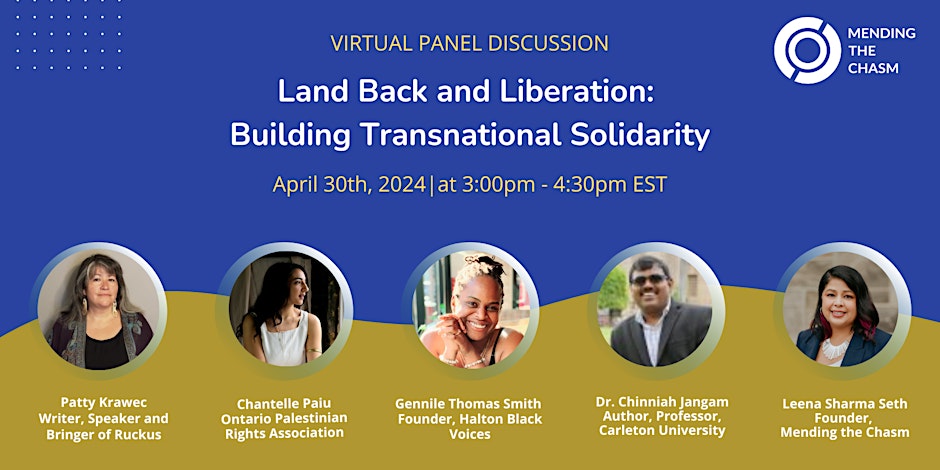
I am also organizing a virtual event for the end of April titled “Land Back and Liberation: Building Transnational Solidarity,” happening on Tuesday, April 30, 2024, from 3 p.m. to 4:30 p.m. Speakers from Indigenous, Black, Dalit, and Palestinian communities will provide insights into the struggles of the community they represent and their advocacy efforts, highlighting the connections between global movements at the local level and animating historical and current-day solidarity across movements.
If you cannot attend any of these events, you can explore the effects of caste discrimination in Canada by watching some of the “Caste in Canada” video interviews (watch one of these, an interview with Kamlesh Ahir, below). The “Caste in Canada” project was undertaken by researchers Dr. Anne Murphy of the University of British Columbia) and Dr. Suraj Yengde (of Harvard University and the University of Oxford; Yengde added “actor” to his list of titles with his role in Ava Duvernay’s film Origin).
And if you’d like to include some learning in your leisure time, look no further than Amazon Prime, Google Play, or Apple TV. Highly acclaimed Black filmmaker, producer, and writer Ava DuVernay, known for the movie Selma and Netflix series When They See Us, recently released a film called Origin, based on the book Caste: The Origins of our Discontents, by Isabel Wilkerson. Origin seeks to connect the devastating impact of the American enslavement of Black Africans, the atrocities of the Holocaust, and the oppressive caste system in India. The narrative intertwines deep sorrow with a cyclical view of history. I can’t recommend it enough and invite readers to check it out to better understand the patterns that many systems of supremacy share.
The hope is that through the amplification of Dalit community excellence, history, resilience, struggles, and contributions over the course of this month, we can educate ourselves about caste supremacy, learn how to recognize it, and most importantly, how to disrupt it when we see it and to work as allies for those who are most harmed by it. In the next piece in this series, I’ll centre the voices of diasporan community members who continue to experience harm from caste discrimination, to help readers understand, in fellow community members’ own words, what this experience is like.
If you missed part 1 of this Dalit History Month series, click here.
Sources:
Bharath, D. 2023. What is India’s caste system? Is it contentious in U.S.? The Associated Press. Url: https://apnews.com/article/india-government-seattle-religion-9acca1a7e005231ecfff35756f211c9c (accessed April 11, 2024).
David, J. S. 2023. I’m queer, and from an ‘untouchable’ caste. In Canada I had to come out of the closet twice. The Toronto Star. Url: https://www.thestar.com/news/canada/i-m-queer-and-from-an-untouchable-caste-in-canada-i-had-to-come-out/article_228971aa-3702-5077-bfbb-cc118cc406a5.html (accessed April 11, 2024).
Sahgal, N., Evans, J., Salazar, A. M., Starr, K. J., and Corichi, M. 2021. Religion in India: tolerance and segregation. 4. Attitudes about caste. Pew Research Center. Url: https://www.pewresearch.org/religion/2021/06/29/attitudes-about-caste/ (accessed April 11, 2024).
Leena Sharma Seth (she/her) is a settler and award-winning consultant, coach, trainer, and speaker at a firm she founded called Mending the Chasm. She works with businesses, organizations, and communities who are ready to create communities and workplaces that are inclusive, belonging-abundant, and safe for all members. When she’s not kicking at the darkness until it bleeds daylight, she’s enjoying road trips, 80s Bollywood music, and perfecting the art of baking cinnamon buns. She’s proud to call Burlington home and to be raising her children with her partner Sanjay.

